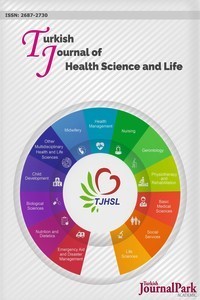Examining Covid-19 Related Anxiety and Obsession Levels Nursing Students
Anxiety, coronavirus, health, obsession, nurse
Examining Covid-19 Related Anxiety and Obsession Levels Nursing Students
Anxiety, coronavirus, health, obsession, nurse,
___
- 1. Ministry of Health, General Directorate of Public Health. (2020). COVID-19 (Sars-Cov-2) Infection Guideline. Date of access:11.12.2021 Erişim adresi: https://acilafet.saglik.gov.tr/Eklenti/37175/0/COVID-19rehberipdf.pdf.
- 2. Huang, C., Wang, Y., Li, X., Ren, L., Zhao, J., Hu, Y., … Cao, B. (2020). Clinical features of patients infected with 2019 novel coronavirus in Wuhan, China. The Lancet, 395(10223), 497–506. http://doi.org/10.1016/S0140-6736(20)30183-5.
- 3. She, J., Jiang, J., Ye, L., Hu, L., Bai, C., & Song, Y. (2020). 2019 novel coronavirus of pneumonia in Wuhan, China: Emerging attack and management strategies. Clinical and Translational Medicine, 9(1). http://doi.org/10.1186/s40169-020-00271-z.
- 4. World Health Organizations (WHO) announces COVID-19 outbreak a pandemic. (2020). Erişim tarihi: 16.04.2020 Erişim adresi: http://www.euro.who.int/en/healthtopics/health-emergencies/coronavirus-COVID-19/news/news/2020/3/who-announcesCOVID-19-outbreak-a-pandemic.
- 5. Wu, Z., McGoogan, J.M. (2020). Characteristics of and Important Lessons From the Coronavirus Disease 2019 (COVID-19) Outbreak in China: Summary of a Report of 72 314 Cases From the Chinese Center for Disease Control and Prevention. JAMA, 323(13):1239-42. doi: 10.1001/jama.2020.2648.
- 6. American Nurses Association (ANA). Nurses, Ethics and the Response to The COVID–19 Pandemic. Available from: https://www. nursingworld.org/~4981cc/globalassets/COVID19/nurses-ethics-and-theresponse-to-the-COVID-19-pandemic_pdf-1.pdf.
- 7. American Organization for Nursing Leadership (AONL). Leading Through COVID-19: Nurse Executive Perspectives AONL and AMN Webinar Summary. Available from: https://www.aonl.org/system/files/ media/file/2020/04/AONL%20AMN%20COVID-19%20Webinar%20 Summary.pdf
- 8. Okuyan, C.B., Karasu, F., Polat, F. (2020). The effect of COVID-19 on the health anxiety levels of nursing students. Van Journal of Health Sciences, 13 (Special Issue):45-52. https://dergipark.org.tr/tr/download/article-file/1126674
- 9. Kürtüncü, M., Kurt, A. (2020). Problems nursing students experience in distance education during the COVID-19 pandemic. Eurasian Journal of Social and Economic Studies, 7(5): 66-77. https://dergipark.org.tr/tr/download/article-file/1128112
- 10. Evren, C., Evren, B., Dalbudak, E., Topcu, M., and Kutlu, N. (2020). Measuring anxiety related to COVID-19: A Turkish validation study of the Coronavirus Anxiety Scale, Death Studies, DOI: 10.1080/07481187.2020.1774969
- 11. Lee, S. A. (2020). Coronavirus Anxiety Scale: A brief mental health screener for COVID-19 related anxiety. Death Studies 44: 393-401. https://doi.org/10.1080/07481187.2020.1748481
- 12. Lee, S. A. (2020). How much “Thinking” about COVID-19 is clinically dysfunctional? Brain, Behavior, and Immunity. https://doi.org/10.1016/j.bbi.2020.04.067.
- 13. Karagöz, Y. (2014). SPSS 21.1 Application, Biostatistics (1st Edition). (page. 698). Nobel Ankara: Academic Publishing.
- 14. Akgül, A., Çevik, O. (2003). Statistical analysis techniques (p. 428). Ankara: Emek Offset.
- 15. Kara, B. (2021). The psychological impact of the COVID-19 pandemic on university students: A review of current evidence. Health and Society,31(2): 32-37. https://ssyv.org.tr/wp-content/uploads/2021/08/4-Universite-Ogrencilerinde-COVID-19-Pandemisinin-Psikolojik-Etkisi-Guncel-Kanitlarin-Gozden-Gecirilmesi-1.pdf
- 16. Lai, J., Ma, S., Wang, Y., Cai, Z., Hu, J., Wei, N., …, Hu, S. (2020). Factors associated with mental health outcomes among health care workers exposed to coronavirus disease 2019. JAMA Netw Open, 3(3): 3976. DOI:10.1001/jamanetworkopen.2020.3976.
- 17. Okuyan, C.B., Karasu, F., Polat, F. (2020). The effect of COVID-19 on the health anxiety levels of nursing students. Van Journal of Health Sciences, 13(Special issue):45-52. https://www.researchgate.net/publication/344434380_COVID-19'un_Hemsirelik_Ogrencilerinin_Saglik_Kaygisi_Duzeyleri_Uzerine_Etkisi
- 18. Huang, L., Xu, F., Liu, H. (2020). Emotional responses and coping strategies of nurses and nursing college students during COVID-19 outbreak. MedRxiv the Preprint Server for Health Sciences. DOI: https://doi.org/10.1101/2020.03.05.20031898
- 19. Wang, C., Pan, R., Wan, X., Tan, Y., Xu, L., Ho, C.S., Ho, R.C. (2020). Immediate psychological responses and associated factors during the initial stage of the 2019 coronavirus disease (COVID-19) epidemic among the general population in China. Int J Environ Res Public Health, 17(5): 1729. DOI: 10.3390/ijerph17051729
- 20. Cao, W., Fang, Z., Hou, G., Han, M., Xu, X., Dong, J., Zheng, J. (2020). The psychological impact of the COVID-19 epidemic on college students in China. Psychiatry Res, 287: 112934. DOI: 10.1016/j.psychres.2020.112934. Epub 2020 Mar 20.
- 21. Li, Y., Wang, Y., Jiang, J., Valdimarsdóttir, U.A., Fall, K., Fang, F., Song, H., Lu, D., Zhang, W. (2021). Psychological distress among health Professional students during the COVID-19 outbreak. Psychol Med, 51(11): 1952-1954. DOI: 10.1017/ S0033291720001555
- 22. Yakar, B., Kaygusuz, T.O., Pirincci, E., Onalan, E., Ertekin, Y.H. (2020). Knowledge, attitude and anxiety of medical students about the current COVID-19 outbreak in Turkey. Fam Pract Palliat Care, 5(2): 36-44. DOI: https://doi.org/10.22391/fppc.737469
- 23. Savitsky, B., Findling, Y., Ereli, A., Hendel, T. (2020). Anxiety and coping strategies among nursing students during the COVID-19 pandemic. Nurse Educ Pract, 46: 102809. DOI: 10.1016/j.nepr.2020.102809
- 24. Özdin, S., Özdin, Ş.B. (2020). Levels and predictors of anxiety, depression and health anxiety during COVID-19 pandemic in Turkish society: The importance of gender. Int J Soc Psychiatry, 66(5): 504–511. DOI: https://doi.org/10.1177/0020764020927051
- 25. Dratva, J., Zysset, A., Schlatter, N., von Wyl, A., Huber, M., Volken, T. (2020). Swiss university students’ risk perception and general anxiety during the COVID-19 pandemic. Int J Environ Res Public Health, 17(20): 7433. DOI: https://doi.org/10.3390/ijerph17207433
- 26. Mertens, G., Gerritsen, L., Duijndam, S., Salemink, E., Engelhard, I.M. (2020). Fear of the coronavirus (COVID-19): Predictors in an online study conducted in March 2020. J Anxiety Disord, 74: 102258. DOI: 10.1016/j.janxdis.2020.102258
- ISSN: 2687-2730
- Başlangıç: 2018
- Yayıncı: Mümin POLAT
The effects of Bacillus amyloliquefaciens on Mentha piperita grown under salt stress
Songül Tuğba ÜNER, Aslıhan CESUR TURGUT
Ayşe Rabia ŞENKAYA, Sabahattin Anıl ARI, İbrahim KARACA
Kemal Yetiş GÜLSOY, Semiha ORHAN
Mehmet KÖK, Fatma DURSUN ERGEZEN, Hilal Gamze HAKBİLEN, Emine KOL, Ayşe YACAN KÖK
THE NEURONAL ANTIINFLAMMATORY EFFECTS OF APELIN-13
Akif DOĞANTEKİN, Esin DOĞANTEKİN, Nevzat GÖZEL
Examining Covid-19 Related Anxiety and Obsession Levels Nursing Students
Endam ÇETİNKAYA, Hatice CEYLAN, Sevgi ASLAN BAYSAL
Evaluation of Dental Anxiety Levels of the Oral and Dental Health Program Students
Abdurrahman ÖĞÜNÇ, Elif Nihan KÜÇÜKYILDIZ
Streptococcus Spp. Isolated Subclinical Mastitis and Its Effect on Public Health
